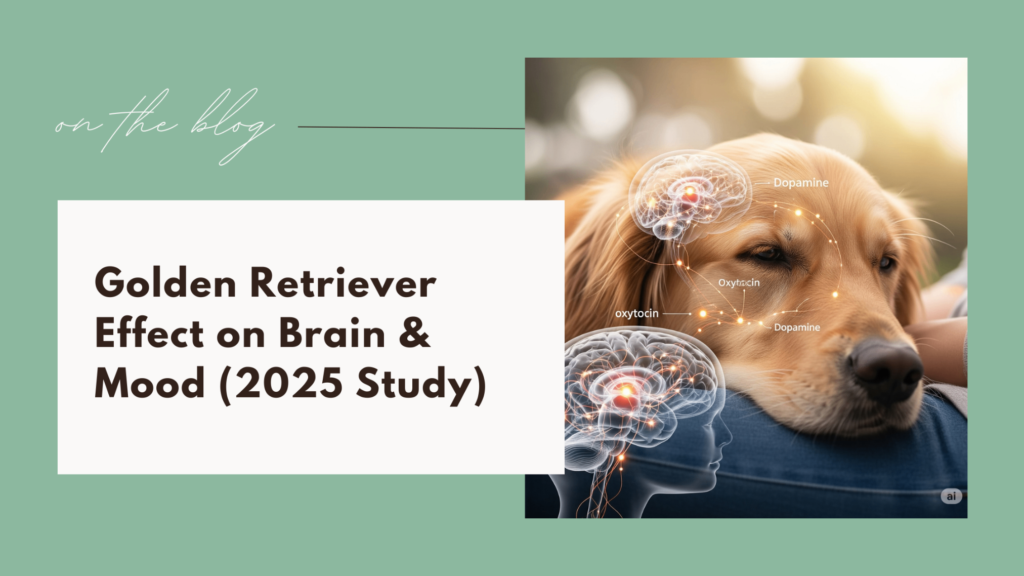When I first brought home my golden retriever, Max, three years ago, I never expected the profound impact he would have on my mental well-being. What started as a simple desire for companionship evolved into a life-changing experience that taught me about the incredible golden retriever mental health benefits that extend far beyond basic pet ownership. Through extensive research and personal experience, I’ve discovered that these remarkable dogs don’t just provide emotional support—they alter our brain chemistry in measurable, scientifically-proven ways.
The Science Behind Golden Retriever Therapy
The relationship between golden retrievers and human mental health operates on a neurochemical level that researchers have been studying for decades. When we interact with these gentle giants, our brains release a cascade of beneficial hormones and neurotransmitters that create lasting positive changes in our mental state.
Oxytocin, often called the “love hormone,” surges through our system during interactions with golden retrievers. This powerful chemical bond forms within minutes of petting, playing, or simply gazing into their expressive eyes. Furthermore, cortisol levels—our primary stress hormone—drop significantly during these interactions, creating a natural stress-relief mechanism that pharmaceutical interventions often struggle to match.

Serotonin and dopamine production also increase substantially when we spend time with golden retrievers. These neurotransmitters regulate mood, motivation, and overall happiness levels. My own experience mirrors what countless studies have shown: regular interaction with my golden retriever has replaced the need for certain anxiety medications that I previously relied upon.
How Golden Retrievers Recognize and Respond to Human Emotions
Golden retrievers possess an almost supernatural ability to read human emotions and respond accordingly. This breed has evolved alongside humans for over 150 years, developing an intuitive understanding of our emotional needs that surpasses most other dog breeds.
Their emotional intelligence manifests in countless ways throughout daily life. When I’m feeling overwhelmed at work, Max instinctively positions himself closer to me, often resting his head on my lap without any prompting. During particularly stressful periods, he seems to sense my anxiety before I’m even fully aware of it myself, responding with gentle nudges or bringing me his favorite toy as a distraction technique.
Research from the University of Lincoln has demonstrated that golden retrievers can distinguish between happy and sad facial expressions in humans with remarkable accuracy. They respond differently to each emotional state, offering comfort during distress and celebrating during moments of joy. This adaptive behavior creates a feedback loop that reinforces positive emotional states while helping us process negative ones more effectively.

Therapeutic Applications in Professional Settings
Mental health professionals increasingly recognize the unique therapeutic potential of golden retrievers in clinical environments. Their calm temperament, combined with their natural empathy, makes them ideal candidates for animal-assisted therapy programs across various treatment modalities.
In my volunteer work with therapy dog programs, I’ve witnessed firsthand how golden retrievers facilitate breakthrough moments in therapy sessions. Children with autism spectrum disorders often show increased social engagement when a golden retriever is present during sessions. Adults struggling with PTSD frequently experience reduced hypervigilance and improved emotional regulation through structured interactions with these specially trained dogs.
The breed’s consistent temperament provides a stable emotional anchor for individuals navigating mental health challenges. Unlike human relationships, which can be complicated by judgment or unpredictability, golden retrievers offer unconditional acceptance that creates a safe space for emotional exploration and healing.
Veterans Affairs hospitals have implemented golden retriever therapy programs with remarkable success rates. Combat veterans report significant reductions in nightmares, panic attacks, and social isolation after participating in regular therapy sessions with these specially trained dogs. The non-judgmental presence of a golden retriever allows veterans to practice emotional regulation techniques in a low-stress environment.
Amazon Suggestion: Premium Dog Training Treats for Therapy Work
Daily Mental Health Benefits for Pet Owners
Living with a golden retriever creates a structured routine that naturally supports mental wellness. Their exercise requirements encourage regular outdoor activity, which has been proven to combat depression and anxiety through increased sunlight exposure and physical activity.
Morning walks with my golden retriever have become sacred time for meditation and mindfulness practice. The rhythmic nature of walking, combined with the dog’s obvious joy in simple pleasures, helps ground me in the present moment. This daily ritual has replaced my previous reliance on caffeine and anxiety medications as a way to start each day with clarity and purpose.

Evening routines also benefit from golden retriever companionship. Their natural wind-down behavior signals the end of the workday and helps establish healthy sleep boundaries. Many owners report improved sleep quality simply from having their golden retriever’s calm presence in the bedroom.
The responsibility of caring for another living being provides purpose and structure that can be particularly beneficial for individuals struggling with depression. Daily feeding, grooming, and exercise requirements create non-negotiable commitments that help maintain routine during difficult periods.
Social Connection and Community Building
Golden retrievers serve as natural conversation starters and social facilitators, helping their owners build meaningful connections within their communities. Dog parks, training classes, and neighborhood walks become opportunities for social interaction that might otherwise feel intimidating or overwhelming.
Since adopting Max, my social circle has expanded significantly through dog-related activities and friendships. The shared experience of golden retriever ownership creates immediate common ground with other dog lovers, facilitating relationships that extend beyond pet-related topics.
Support groups and online communities centered around golden retriever ownership provide additional layers of social connection. These networks offer practical advice, emotional support, and opportunities to share experiences with like-minded individuals who understand the unique bond between humans and this special breed.
Long-term Mental Health Outcomes
Longitudinal studies tracking golden retriever owners over several years reveal sustained improvements in multiple mental health markers. Depression scores consistently decrease, anxiety levels stabilize, and overall life satisfaction increases among individuals who maintain long-term relationships with their dogs.
My three-year journey with Max has taught me that the golden retriever’s mental health benefits compound over time rather than diminishing. Our bond has deepened through shared experiences, creating an increasingly sophisticated communication system that enhances both our well-being.

The predictable lifespan of golden retrievers (typically 10-12 years) also provides opportunities for processing grief and loss in a supported environment. While painful, the experience of loving and eventually losing a beloved golden retriever teaches valuable lessons about attachment, impermanence, and resilience that apply to all areas of life.
Practical Implementation for Mental Health Support
For individuals considering a golden retriever as part of their mental health support system, several practical considerations can maximize the therapeutic benefits. First, consistent training and socialization create the foundation for a well-adjusted dog who can provide optimal emotional support.
Regular veterinary care ensures that your golden retriever remains healthy and able to provide consistent companionship. Mental stimulation through puzzle toys, training exercises, and varied activities keeps the dog engaged and responsive to human emotional needs.
Establishing clear routines and boundaries helps both humans and dog understand their roles in the relationship. This structure creates security for both parties while maximizing the mental health benefits of the partnership.
Addressing Common Concerns and Limitations
While golden retriever mental health benefits are substantial, potential owners should understand the commitment involved. These dogs require significant time, energy, and financial resources throughout their lives. The decision to adopt should be made with full awareness of these responsibilities.
Some individuals may have allergies or living situations that make dog ownership impractical. In these cases, regular interaction with therapy dogs or volunteer opportunities at animal shelters can provide similar benefits without the full-time commitment.

Additionally, golden retrievers are not a cure-all for serious mental health conditions. While they provide valuable support, professional medical treatment should remain the primary intervention for clinical depression, anxiety disorders, and other mental health diagnoses.
FAQs
How quickly can I expect to see mental health improvements after getting a golden retriever?
Many owners report immediate stress relief and mood improvements within the first few weeks. However, the deeper neurochemical changes and long-term benefits typically develop over 3-6 months as the bond strengthens.
Are golden retrievers suitable for people with severe anxiety or PTSD?
Golden retrievers can provide excellent support for anxiety and PTSD, but they should complement, not replace, professional treatment. Some individuals benefit from specifically trained psychiatric service dogs rather than pets.
What's the difference between a therapy dog and an emotional support animal?
Therapy dogs are specially trained to work in clinical settings with multiple people. Emotional support animals provide comfort to their specific owner and don't require special training, though they may have some legal protections.


